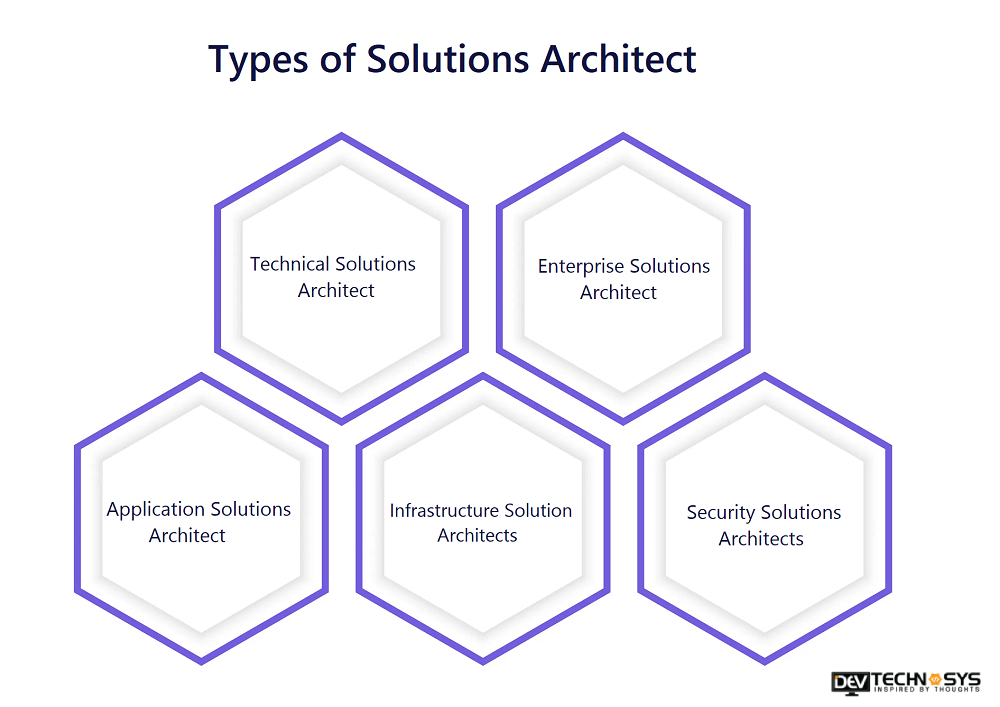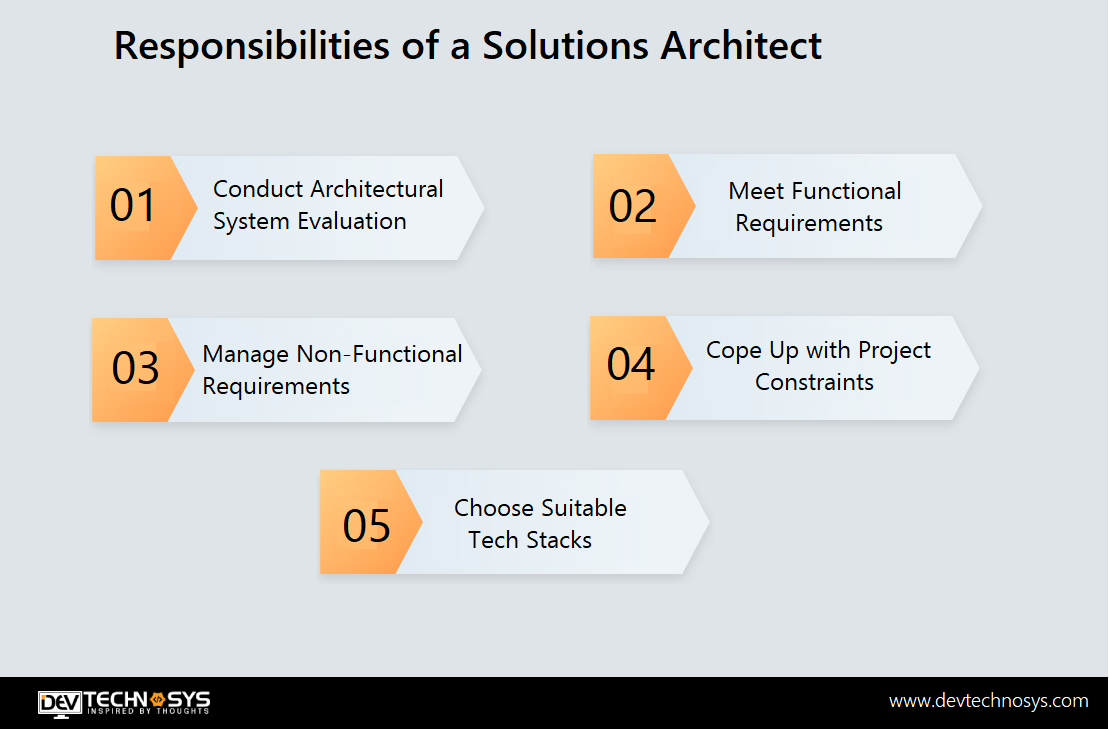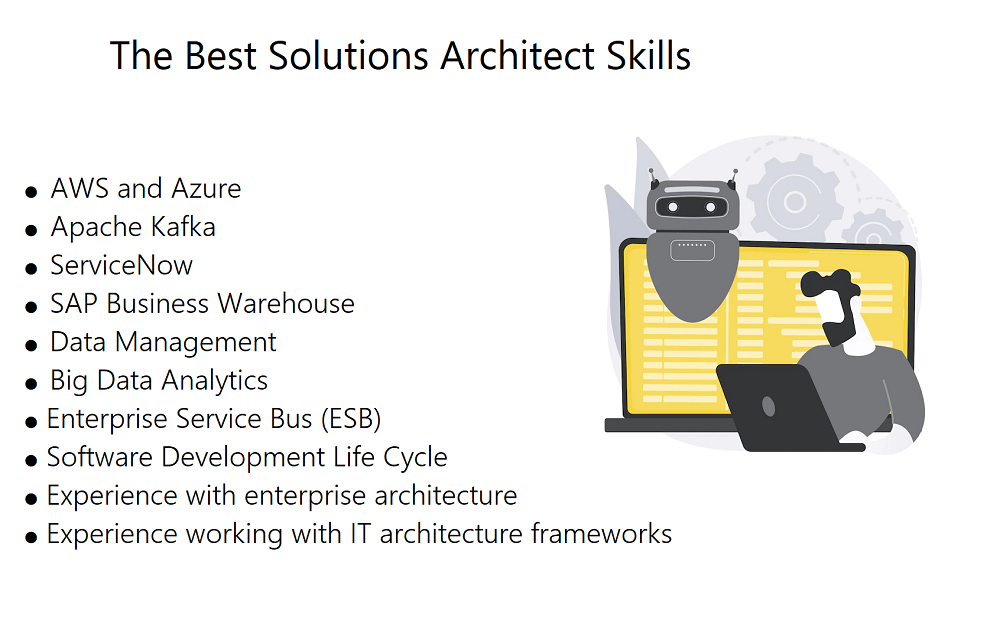We all live in a technically advanced and rapidly changing environment where businesses must change their systems per the ongoing technological trends. It is undoubtedly true that a successful company is nothing without a strong software base. As a result, many businesses realize the importance of cutting-edge technology and innovation to expand and multiply their efforts. It is where the solutions architect roles and responsibilities come into the picture.
With a digital transformation and demand for specialized knowledge and professional experience, it is essential to ensure that the company requirements are compatible with the planned technology solutions. As a result, IT solutions architect help businesses smoothen their process. So, if you are either new to the business world or have been running it for a long, you must read this blog once. So, without delaying further, let’s get started!
What Is A Solutions Architect?
A solution architect is a professional responsible for designing, planning, and implementing solutions within an organization. The solution architect roles and responsibilities include designing technical architectures, choosing ideal tools & technologies, and ensuring that the trending solution aligns with the organization’s business goals and strategies.
Solution architects possess a broad understanding of the latest technologies and determine how they can solve business problems. In addition, the professionals work closely with stakeholders such as business analysts, developers, and project managers to understand the project requirements and design an appropriate solution.
No matter, whatever might be your business domain, solution architects may work in a variety of industries, including information technology, finance, healthcare, and retail, among others. They typically have a strong custom software development, system design, and project management background and may also have specialized knowledge in a particular industry or technology domain. We hope now you have got an idea of – What is a solutions architect and can move further with the process.
How Many Types of Solutions Architect Are There?
Today, there are various types of solutions architects available in the market, depending on the specific focus of their work and the industry in which they operate. Some common types of solution architects include:

1. Technical Solutions Architect
These technical solutions architect professionals focus on the technical aspects of a solution. Therefore, these solutions architect responsibilities include the technical architecture design and choosing appropriate tools and technologies.
2. Enterprise Solutions Architect
These architects work at the enterprise level, designing solutions aligning with the overall business strategies and goals. As a result, enterprise solutions architects often broadly understand multiple business units and organizational functions.
3. Application Solutions Architect
These IT professionals focus on application design and implementation. Application solutions architects work closely with mobile app developers and other stakeholders to ensure timely project delivery. Businesses who need assistance with mobile app development can hire an application solutions architect.
4. Infrastructure Solution Architects
These architects focus on designing and implementing infrastructure solutions, including data centers, networking, and cloud computing. Infrastructure IT solutions architect roles and responsibilities are to ensure that the infrastructure is scalable, secure, and able to support the organization’s needs.
5. Security Solutions Architects
These professionals specialize in designing and implementing security solutions to protect an organization’s data and systems. Security solutions architects focus on network, data, or cloud security.
These are the five types of solutions architect roles every business owner must know. Different projects have different requirements for IT architects. So first, it is essential to define the business requirements and then hire dedicated solutions architect accordingly.

What Does Solutions Architects Do?
There are multiple roles and responsibilities of solutions architect roles. Every architect performs different activities to help businesses accomplish their goals. The following are the points highlighting – What do solutions architects do?

- Understand the business requirements and goals of the organization and design solutions that align with them.
- Research and evaluate new technologies and tools to determine their suitability for the organization.
- Design the technical architecture of the solution, including the hardware, software, and networking components.
- Collaborate with developers and other stakeholders to ensure that the solution meets the needs of the business.
- Coordinate the development and deployment of the solution, including managing budgets, schedules, and resources.
- Ensure that the solution is scalable, secure, and able to support the organization’s needs.
- Provide ongoing mobile app support and maintenance for the solution.
- Communicate effectively with stakeholders and team members to ensure everyone is informed about the progress and solution status.
It is the work process that solutions architects perform to bring business excellence and efficiency. Now, let’s get an in-depth insight into the solutions architect roles and responsibilities.
How To Create A Mobile Application
What Is the Solutions Architect Role?
The solution architect ensures the result satisfies all business requirements and stakeholder expectations. They create a technical vision first to show how the software would fulfill the needs of the business.
Experienced and dedicated solutions architect clearly communicates their technological vision to their development team. The solution architect assists the team and leads the project through implementation.
On the other hand, the software development team adheres to the Agile methodology. They create prototypes simultaneously to identify technological constraints or advance the product concept.

Here is a list of a solution architect’s roles –
- Offer the top recommendations for the overall solution.
- Create solutions seamlessly integrating with an enterprise environment.
- Meet all technical and business requirements.
- Choose a technological stack, then assess your resources.
- Act as a communication and helping asset between the sales and technical teams to convert the needs into results.
- Choose modern-age business solutions.
- Analyze project limitations to run processes, analyze alternatives and reduce risks when required.
What Is The Solutions Architect Responsibilities?
Now that you know the roles of a solutions architect in bringing business excellence let’s discover the responsibilities of a dedicated IT solutions architect.

1. Conduct Architectural System Evaluation
Before deploying a product or software, the solutions architect is responsible for analyzing the company’s IT landscape to meet the business expectations with the current IT capabilities. In addition, it allows the solutions architect experts to determine whether the newly developed software will fit within the existing enterprise environment. To accomplish this, the solutions architect has to get well-versed in the OS, processes, and app architecture.
2. Meet Functional Requirements
Now, you might be wondering, what are functional requirements? Any business specification that signifies the software’s performance is defined as the functional requirement. For instance –
- Some of the mobile app functionalities should work in an offline mode.
- The website does not support offline mode; without an internet connection, the users cannot access anything.
- As soon as the user sign-up for a new app, an email is sent to them via mail.
So, here the responsibility of the solutions architect is to ensure that the software meets all the needs and requirements well.
3. Take Care of Non-functional Requirements
Besides meeting the functional needs and requirements, solutions architects should also adhere to the non-functional requirements of the software. For instance, a user is creating an account on your business app, so how long will the login process take?
These activities come into the non-functional requirements of a project. So, it is the solutions architect’s responsibility to handle such project requirements. Besides this, the architect should ask the following questions while working on the non-functional requirements, such as –
- What would be the default languages and additional languages of an application?
- Will the mobile app support portrait mode only?
- Does the app support native font or any other?
4. Cope Up with Project Constraints
Every project has a constraint that keeps varying from one type of project to the other. The most common project constraints incorporate – Money, time, risk, limitation, and licensing.
Suppose, let us take an example – You are developing a medicine delivery app; the solutions architect will make sure the app should be HIPPA compliant.
Other than this, if you are developing a live music streaming app like Spotify, you must have a valid license and copyrights. Also, the process will take enough mobile app development cost, so make your hold the desired budget for the same.
5. Choose Suitable Tech Stacks
A mobile app’s tech architecture strategy depends on the modern-age technologies chosen by the solutions architect. Multiple programming languages, libraries, frameworks, standards, and architectural patterns are available, and each has different tech stack requirements. Here comes the solutions architect’s responsibility to choose the best suitable one.
This is all about the roles and responsibilities of solutions architect that every business owner should know before hiring an IT solutions architect for their project.
Determine The Exact Cost of Mobile App Development
What Should Be The Best Solutions Architect Skills?
An effective solutions architect must possess strong leadership and communication skills along with the technical and business knowledge to properly align IT solutions with business objectives.
To determine which IT solutions would best serve the company’s objectives, you will need to have a solid understanding of the business as a solutions architect. In addition, your ability to act as a leader will be crucial for directing the overall establishing process of business objectives.

As per the research, the major technical skills of solutions architect includes the following –
- AWS and Azure
- Apache Kafka
- ServiceNow
- SAP Business Warehouse
- Data Management
- Big Data Analytics
- Enterprise Service Bus (ESB)
- Software Development Life Cycle
- Experience with enterprise architecture
- Experience working with IT architecture frameworks
What Is The Solutions Architect Salary?
A solutions architect makes an average yearly pay of $119,000 dollars. Entry-level employees make an average of about $76,000 a year, with reported incomes ranging from $75,000 to $160,000.
The stated average earnings for solutions architects in San Jose and San Francisco are $144,000 and $132,000 annually, respectively.

Summing Up!!!
An IT solutions architect is responsible for creating and implementing an IT architecture that satisfies the intended business requirements. They begin by gathering business needs, learning the requirements’ details, and working with stakeholders to provide the desired outcome.
We now anticipate that you have answers to all the pertinent questions regarding – What is a solutions architect and more. For more knowledge and assistance, get in touch with Dev Technosys. We are a leading mobile app development company and can assist all-scale businesses with all app development services. Hire dedicated developers and let them take your business to the heights.





















Discussion about this post